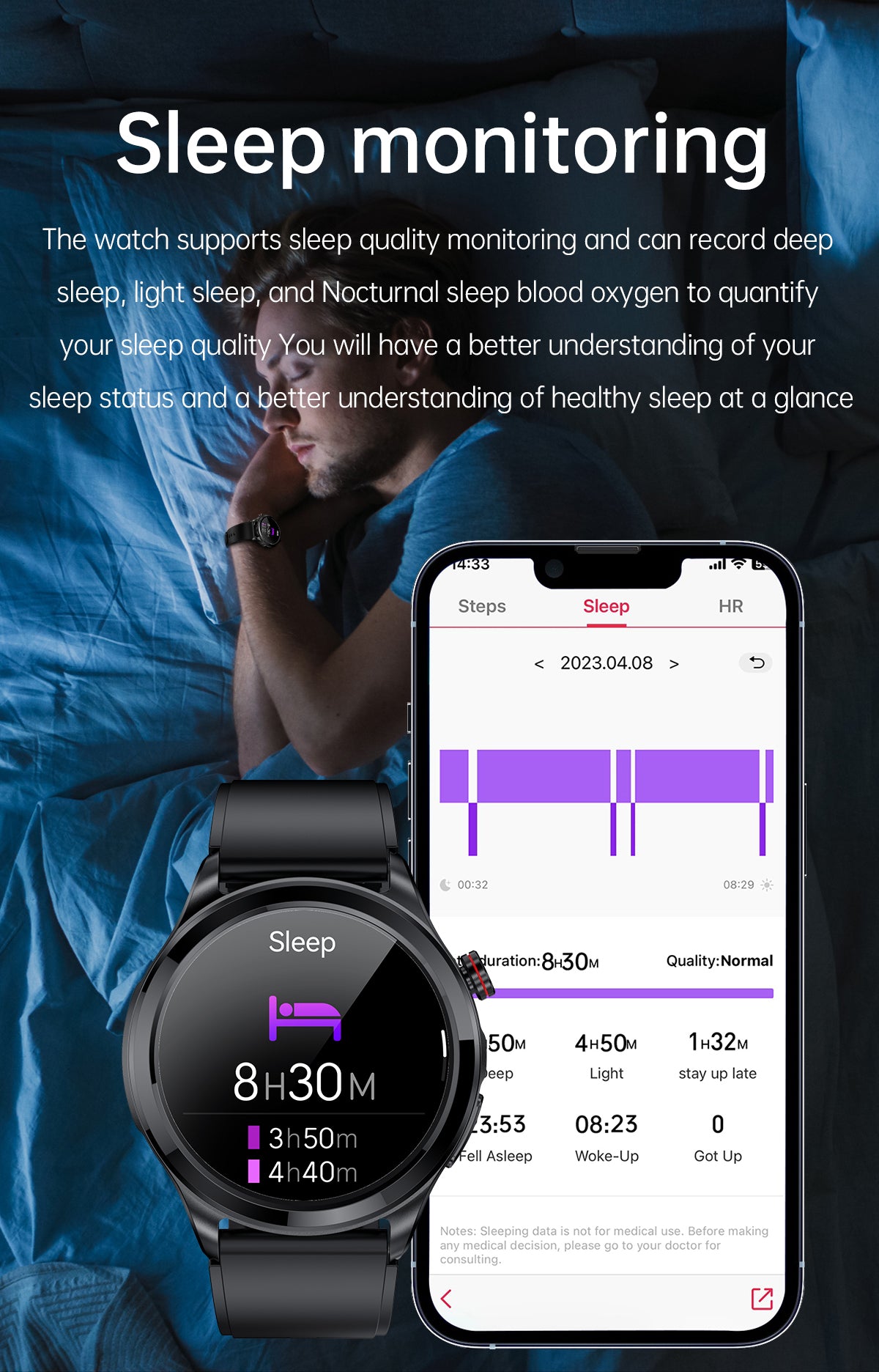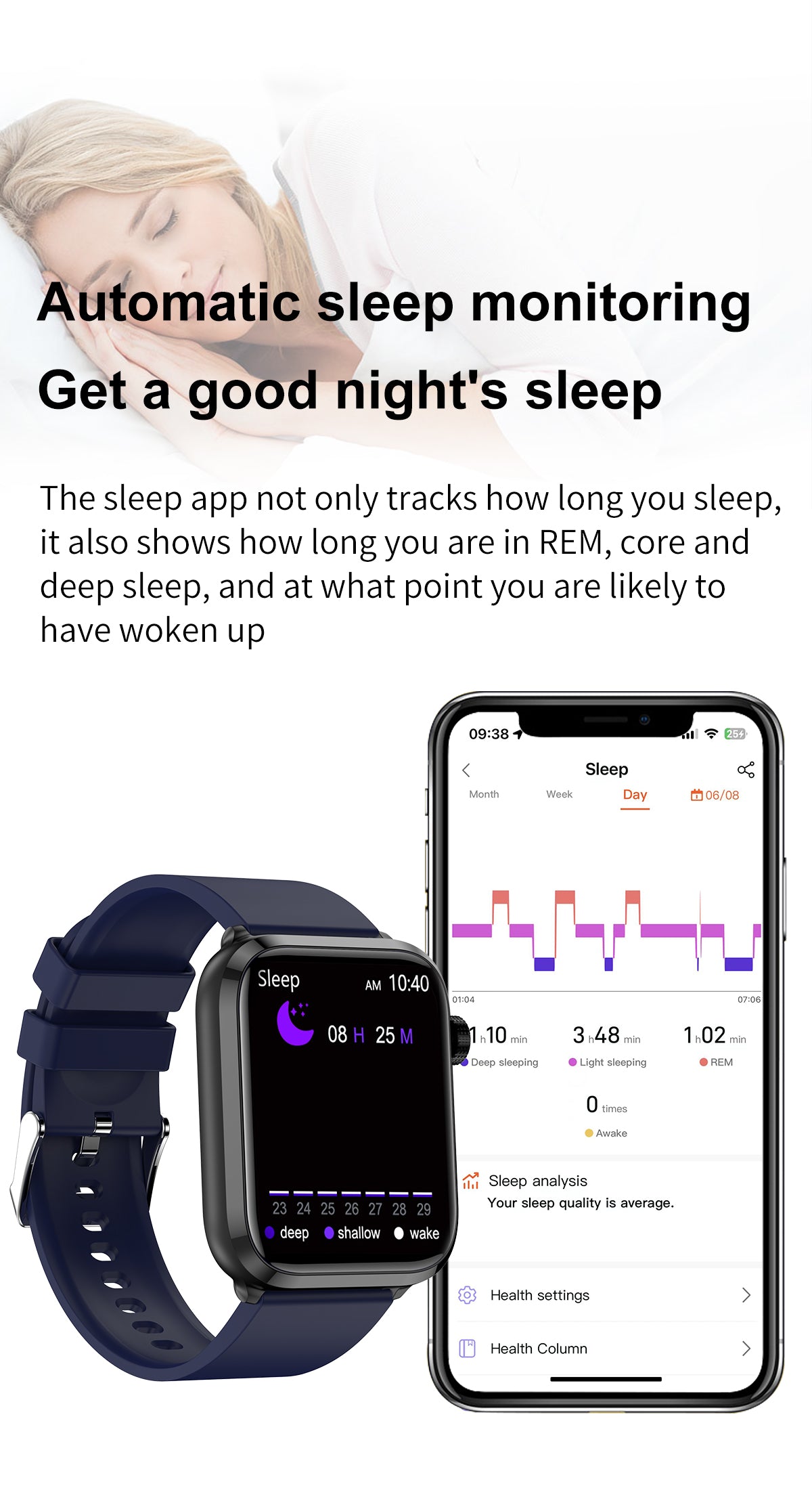Montre connectée avec suivi du sommeil
Les humains sont des créatures d'habitudes. Comme toute routine, une routine régulière au coucher aide notre cerveau à reconnaître le moment où il est temps de dormir. En effectuant les mêmes activités dans le même ordre chaque soir, votre cerveau commence à considérer ces activités comme des signaux indiquant qu'il est temps de se détendre.
Une routine du coucher joue un rôle crucial pour atténuer le stress et l’anxiété nocturnes. Les pensées anxieuses, celles qui vous empêchent de dormir la nuit, déclenchent vos pensées et votre système nerveux sympathique. Si vous ne les contrôlez pas, ces pensées s’intensifient et se transforment en insomnie. En adhérant à une routine du coucher, vous pouvez rediriger votre énergie vers d’autres tâches et vous permettre de vous détendre.
L’importance d’une heure de coucher régulière remonte à l’enfance. Pour les nourrissons et leurs parents, une heure de coucher régulière s’est avérée atténuer les pensées agitées, aider les enfants à s’endormir plus rapidement et réduire la fréquence des réveils nocturnes.
Une heure de coucher raisonnable aide les enfants à rester connectés au rythme circadien naturel, à apprendre à se calmer et à développer des habitudes saines qui favorisent un bon sommeil. Une heure de coucher régulière a des effets positifs considérables sur d'autres aspects de la vie d'un enfant, notamment l'amélioration de la mémoire, de la santé dentaire et de l'attention.
Cependant, une heure de coucher régulière est tout aussi importante pour les adultes. Une routine du coucher aide votre cerveau à séparer le jour de la nuit, permettant ainsi à votre esprit et à votre corps de se débarrasser du stress de la journée et de se détendre pour dormir.
Mais la vie moderne rend souvent difficile de s'endormir à l'heure idéale. Voici quelques méthodes à essayer :
-
Prenez un bain chaud : Dans le cadre du cycle veille-sommeil, votre corps subit divers changements hormonaux tout au long de la journée. L’un d’eux est la production de mélatonine, qui commence le soir pour vous préparer au sommeil. Il a été démontré que simuler la baisse de température nocturne en prenant un bain chaud induit une réponse similaire à l’endormissement. Pensez à prendre un bain chaud environ une heure avant de vous coucher. Votre corps se réchauffera grâce à l’eau et se refroidira rapidement lorsque l’eau s’évaporera, créant une sensation de fatigue et de détente.
-
Écouter de la musique : Soixante-deux pour cent des gens écoutent de la musique pour s'endormir. Tant que la musique vous détend, le genre n'a pas d'importance. Fermez les yeux, écoutez de la musique, laissez-la vous distraire de vos soucis et calmez-vous.
D’autres types de sons peuvent également être bénéfiques pour le sommeil, comme les sons ambiants et le bruit blanc ou rose. Il a été prouvé que le bruit rose (comme la pluie ou les vagues de l’océan) améliore la qualité du sommeil, tandis que le bruit blanc peut vous aider à vous endormir plus rapidement en masquant les autres sons.
-
Étirez-vous, respirez et détendez-vous : Les techniques de relaxation comme les exercices de respiration profonde ou la relaxation musculaire progressive peuvent libérer les tensions physiques et mentales en se concentrant sur son corps et en se relaxant consciemment. Il a été prouvé qu'intégrer une routine de yoga simple à votre emploi du temps quotidien améliore la qualité du sommeil. Quelques étirements ou massages simples avant le coucher peuvent faire beaucoup. Faire du yoga doux, des exercices d'étirement et des mouvements de respiration peut vous aider considérablement à vous endormir.
-
Lisez un bon livre : La lecture est une activité courante avant le coucher qui commence souvent dès l'enfance, lorsque les parents lisent à leurs enfants avant de les coucher. Il n'est pas recommandé de lire des livres passionnants ou pleins de suspense ; il est préférable de choisir des livres dont l'intrigue est même ennuyeuse ou dénuée de toute excitation, ce qui vous fait facilement vous endormir.
Aujourd’hui, grâce aux progrès technologiques, l’intégration des montres connectées dans votre routine du coucher peut apporter des avantages supplémentaires. Les montres connectées sont équipées de fonctionnalités conçues pour améliorer la qualité de votre sommeil et votre bien-être général. De nombreuses montres connectées offrent des fonctionnalités de suivi du sommeil, fournissant des informations sur vos habitudes de sommeil, notamment la durée et la qualité de vos cycles de sommeil.
De plus, certaines montres connectées proposent des exercices de relaxation et de respiration guidée, facilitant le processus de détente avant le coucher. Les vibrations douces ou les sons apaisants de votre montre connectée peuvent servir d'alternative moderne aux réveils traditionnels, vous réveillant progressivement et minimisant les perturbations du sommeil.
Adopter la technologie, c'est comme intégrer une montre intelligente dans votre routine du coucher, vous permet d'harmoniser les pratiques traditionnelles avec des outils innovants pour une approche plus holistique de la santé du sommeil.










